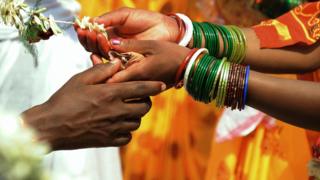Why attending an Indian wedding can be dangerous
Wedding celebrations are supposed to be happy events but in northern India, a shocking number end tragically, thanks to a surprisingly tenacious tradition of celebratory gunfire.
Take the wedding party in a small village called Raipur Bhood in the northern state of Uttar Pradesh last weekend.
The photographer, employed to immortalise the special day, was shot dead by members of the grooms’ family during a celebration ahead of the marriage party when the men pulled out weapons and started firing.
Raju, known locally as Pintu, was shot in the stomach and died of his injuries in hospital later. A 17-year-old girl called Meenakshi was also shot and injured.
Celebratory gunfire isn’t intended to injure or maim but Raju and Meenakshi were not the only victims that weekend.
The father of the groom at another north Indian village shot and injured a 12-year-old boy, while in a third village, a woman was injured as she watched a wedding.
Then there was the wedding party in the Alipur suburb of the capital, Delhi, earlier in the week. As the wedding celebration was in full swing, one of the guests, a man named Vikas Kumar, pulled out a shotgun and a pistol and started firing.
He loosed two shots into the air and a third at the ground. Two of the groom’s friends and three members of the wedding band were shot in their legs and feet. All five were admitted to hospital.
In February alone, a total of four people were killed in celebratory firing in weddings just in the state of Uttar Pradesh.
In one incident, the groom himself was fatally wounded after one of his guests fired in the air.
Amit Rastogi was leading the traditional procession to the bride’s house on a horse when he was hit in the head.
Naturally enough, celebratory gunfire is something the Indian authorities are keen to muzzle.
“Firing with guns and pistols during marriage processions has become a sort of fashion,” observed a Delhi judge as he handed down a 25-month jail term to a man who fired off a rifle during his friend’s wedding last year, killing the groom’s uncle.
“It is high time that government tightens the procedure for grant of arms-licence and also evolves a robust mechanism to ensure these licenses are not misused,” Judge Manoj Jain said.
Meanwhile, a court in the Uttar Pradesh capital, Lucknow, has ordered that every case of celebratory firing be investigated regardless of whether a case has been lodged with the police.
“Escalation of this trend has to be arrested,” warned Justice SK Saxena.
Some families have responded with a no weapons policy at their weddings.
“Kind Request: Please Do Not Indulge In Celebratory Firing & Alcoholism,” read the invitation that went out to the 3,000 guests of Mahirajdhwaj Singh Chandel.
“In the recent times,” he explained to The Times of India, “we have witnessed that innocent lives are lost in celebratory firing, and a joyous occasion then simply transforms itself into that of a mourning.”
So what on earth is going on?
Celebratory gunfire is partly a show of machismo and status, partly an alternative to fireworks, and it is not confined to north India. It is also common in Afghanistan and parts of the Middle East, Balkans and elsewhere.
Most commonly guns are fired into the air in the mistaken belief that it will avoid injuring anyone. In fact those hit by falling bullets are far more likely to suffer a fatal injury than those in a normal shooting, according to a study by doctors at a Los Angeles hospital.
The doctors identified 118 people who had been hit by falling bullets between 1985 and 1992 and found that the death rate was close to one third, compared to between 2% and 6% for those injured in regular shootings.
The bullets were travelling more slowly than those fired directly at a person but were more likely to hit victims on the head.
According to the study, a spent bullet falls back to earth at between 90 and 180 metres per second, fast enough to cause a fatal skull injury.
In 2003, the US Centres for Disease Control and Prevention investigated the risks following New Year celebrations in Puerto Rico in 2003-04. It concluded that 19 injuries and one death were caused by falling bullets over a two-day period.
“Bullets are not greetings cards – celebrate without weapons,” was the slogan of a TV and radio campaign in Macedonia in 2005.
The Indian authorities would be wise to undertake a similar campaign.
Source: Read Full Article



